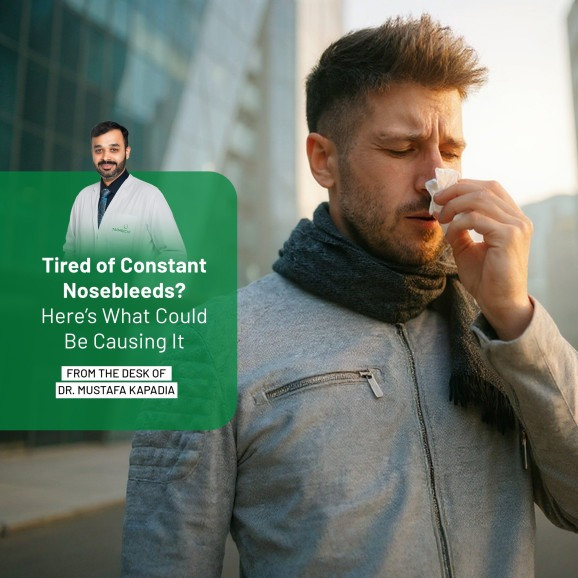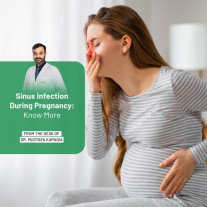Tired of Constant Nosebleeds? Here’s What Could Be Causing It
Contact Us
Nosebleeds are one of those unexpected and often alarming experiences that can disrupt your day without warning. While most people chalk them up to dry air or random irritation, persistent or frequent nosebleeds could signal a deeper issue one that’s often overlooked: hypertrophied nasal turbinates.
If you’ve been dealing with constant nasal bleeding or congestion, it may be time to consult best ENT specialist in Dubai. In this blog, we’ll explore how turbinate swelling contributes to nosebleeds, common triggers in Dubai’s climate, and when to seek treatment from the best ENT doctor in Dubai.
What Are Nasal Turbinates and Why Do They Swell?
Inside each side of your nose are small, scroll-like structures called turbinates. Their job is to warm, humidify, and filter the air you breathe. Covered in mucous membrane, they help trap dust, allergens, and other irritants before they enter your lungs.
However, turbinates can become enlarged, a condition called turbinate hypertrophy due to:
- Chronic allergies (allergic rhinitis)
- Infections or sinusitis
- Exposure to irritants like pollution or smoke
- Structural abnormalities like a deviated septum
- Hormonal changes
When turbinates swell, airflow is restricted. This can lead to mouth breathing, poor sleep, postnasal drip, and you guessed it frequent nosebleeds. At Tarabichi ENT, specialists evaluate these underlying conditions and offer personalized treatment for long-lasting relief.
The Hidden Link Between Turbinate Hypertrophy and Nosebleeds
You might be wondering how does turbinate swelling cause bleeding?
The answer lies in the delicate blood vessels that line your nasal passages. One of the most common sites of nosebleed origin is Little’s area, located near the front of the nasal septum. This area is dense with tiny arteries that are vulnerable to irritation and rupture.
When your turbinates are hypertrophied, they can:
- Cause friction within the nasal cavity
- Increase mucosal dryness and sensitivity
- Worsen inflammation from allergies or infections
- Interfere with normal airflow, leading to over-blowing or picking
Over time, this sets the stage for recurrent or spontaneous nosebleeds, especially in dry or extreme climates like Dubai.
Why Is Nosebleeding So Common in Dubai?
Dubai’s unique climate is often a hidden culprit. With scorching summers and constant indoor air conditioning, nasal dryness is a year-round concern.
Hot Weather Nosebleeds
The high temperatures during Dubai’s summer months can:
- Dehydrate your nasal lining
- Cause blood vessels to become fragile and rupture
- Increase blood pressure during heat exposure, triggering bleeds
Best practices to avoid hot-weather nosebleeds:
- Stay hydrated
- Avoid peak sunlight hours
- Use cooling packs on the face when needed
- Avoid blowing your nose aggressively after being outside
Cold and Dry Indoor Air
On the flip side, air conditioning and indoor heating systems create an artificially dry environment. Prolonged exposure to this kind of air:
- Dries out your nasal mucosa
- Makes your turbinates more prone to cracking
- Weakens the blood vessels lining the nose
Prevention tips:
- Use a humidifier at home and work
- Apply saline sprays or nasal gels
- Stay away from direct AC airflow
- Keep your nasal passages moisturized, especially at night
Whether it’s the hot desert climate or freezing indoor temperatures, the best ENT doctors for nosebleeds in Dubai understand how to identify the exact environmental triggers and offer practical, effective solutions.
Other Common Causes of Nosebleeds
While turbinate hypertrophy is often to blame, there are other contributors that increase your risk of nasal bleeding:
In Children:
- Frequent nose picking
- Allergies and colds
- Dry air exposure
In Adults:
- Structural problems (e.g., deviated septum)
- Smoking or chemical irritants
- Overuse of nasal sprays
- Blood thinners or aspirin
In the Elderly:
- Fragile blood vessels
- Medications that affect clotting
- High blood pressure (hypertension)
- Tumors or polyps (less common but serious)
Older adults may experience torrential nosebleeds that last longer or are difficult to control. These are considered medical emergencies and must be treated promptly by the best ENT specialists in Dubai, such as the experts at Tarabichi ENT.
Altitude and Allergies: Lesser-Known Triggers
High-Altitude Nosebleeds
Traveling to mountainous regions or flying frequently? High elevations expose your nasal tissues to lower oxygen and humidity levels, making them dry and prone to rupture.
Tips for altitude-induced nosebleeds:
- Ascend gradually to allow acclimatization
- Use saline sprays during and after flights
- Keep nasal passages moisturized with gel or ointment
Allergic Rhinitis
Constant sneezing, blowing, and rubbing your nose due to allergies can damage your nasal lining. Add turbinate swelling to the mix, and your chances of bleeding increase.
Manage allergy-related nosebleeds by:
- Taking antihistamines
- Using steroid or antihistamine nasal sprays
- Avoiding exposure to known allergens like dust, pollen, and pet dander
If allergies are the root cause of your nasal irritation, the best ENT specialist in Dubai will provide targeted allergy management along with turbinate care.
How to Stop a Nosebleed: First Aid at Home
If you experience a sudden nosebleed, don’t panic. Here’s what to do:
- Sit upright and lean forward slightly (do not tilt your head back).
- Pinch both nostrils together just below the bridge.
- Breathe through your mouth while applying gentle pressure for 10–15 minutes.
- Apply a cold compress over your nose or forehead.
- Avoid blowing your nose for a few hours after bleeding stops.
If the bleeding lasts more than 20 minutes or recurs frequently, it’s essential to see a specialist. Persistent nosebleeds may signal more serious underlying issues that require medical treatment.
When to See a Specialist at Tarabichi ENT
You should seek help from the best ENT doctors in Dubai if:
- Your nosebleeds occur more than once a week
- You feel dizzy or lightheaded during bleeding episodes
- You're using blood thinners or having high blood pressure
- You have nasal congestion, obstruction, or postnasal drip alongside bleeding
- You’ve tried home care with no improvement
Don’t Ignore the Signs
Recurring nosebleeds aren’t just a minor inconvenience; they’re a signal that something deeper may be affecting your nasal health. From dry weather and allergies to hypertrophied turbinates, there are many reasons your nose might be bleeding more often than it should.
The good news? Relief is within reach. With proper evaluation and care from the best ENT doctors in Dubai at Tarabichi ENT, you can manage the cause, prevent future episodes, and breathe more comfortably every day.
CONSULT A TRUSTED ENT SPECIALIST IN DUBAI
Frequent or unexplained nosebleeds can be more than just a minor nuisance; they may signal an underlying issue such as dry nasal passages, allergies, or structural problems like a deviated septum. If ignored, recurrent nosebleeds can interfere with daily life and may even point to more serious health concerns.
If you’re experiencing ongoing nasal bleeding, it’s important to consult a trusted ENT specialist for nosebleeds in Dubai. At Tarabichi ENT, our leading ENT experts offer thorough evaluations and advanced treatments, ranging from nasal cauterization to turbinate management, designed to stop the bleeding at its source and restore long-term nasal health.
Our team of the Best ENT doctors in Dubai, at Tarabichi Healthcare is committed to delivering world-class care with precision and compassion.
Meet our dedicated specialists: Dr. Muaaz Tarabichi, Dr. Michael Timms, Dr. Mustafa Kapadia, Dr. Satish Jain, Dr. Shailesh Khode, Dr. Baher Ashour and Dr. Jamal Kassouma.
We provide minimally invasive treatments tailored to your condition, with a strong focus on safety, accuracy, and long-term results.
For Consultations and Appointments, reach out to us at
(best ENT doctors in Dubai, best ENT specialist in Dubai, best ENT doctors for nosebleeds in Dubai




